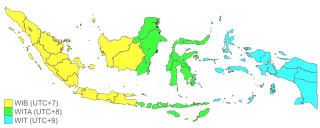
A time zone is an area which observes a uniform standard time for legal, commercial and social purposes. Time zones tend to follow the boundaries between countries and their subdivisions instead of strictly following longitude, because it is convenient for areas in frequent communication to keep the same time.

Japan Standard Time, or Japan Central Standard Time, is the standard time zone in Japan, 9 hours ahead of UTC (UTC+09:00). Japan does not observe daylight saving time, though its introduction has been debated on several occasions. During World War II, the time zone was often referred to as Tokyo Standard Time.

Summer time in Europe is the variation of standard clock time that is applied in most European countries in the period between spring and autumn, during which clocks are advanced by one hour from the time observed in the rest of the year, with a view to making the most efficient use of seasonal daylight. It corresponds to the notion and practice of daylight saving time (DST) to be found in many other parts of the world.

Eastern European Time (EET) is one of the names of UTC+02:00 time zone, 2 hours ahead of Coordinated Universal Time. The zone uses daylight saving time, so that it uses UTC+03:00 during the summer.

Moscow Time is the time zone for the city of Moscow, Russia, and most of western Russia, including Saint Petersburg. It is the second-westernmost of the eleven time zones of Russia. It has been set to UTC+03:00 without DST since 26 October 2014; before that date it had been set to UTC+04:00 year-round on 27 March 2011.
The Yukon Time Zone was a time zone that kept standard time; Yukon Standard Time (YST) was obtained by subtracting nine hours from Coordinated Universal Time (UTC) resulting in UTC−09:00. Yukon Daylight Time (YDT) when observed was eight hours behind UTC. In 1983 the UTC−09:00 based time zone was restructured and renamed the Alaska Time Zone.

UTC+08:00 is an identifier for a time offset from UTC of +08:00.

UTC+03:00 is an identifier for a time offset from UTC of +03:00. In areas using this time offset, the time is three hours later than the Coordinated Universal Time (UTC). Following the ISO 8601 standard, a time with this offset would be written as, for example, 2019-02-08T23:36:06+03:00.

South African Standard Time (SAST) is the time zone used by all of South Africa as well as Eswatini and Lesotho. The zone is two hours ahead of UTC (UTC+02:00) and is the same as Central Africa Time. Daylight saving time is not observed in either time zone. Solar noon in this time zone occurs at 30° E in SAST, effectively making Pietermaritzburg at the correct solar noon point, with Johannesburg and Pretoria slightly west at 28° E and Durban slightly east at 31° E. Thus, most of South Africa's population experience true solar noon at approximately 12:00 daily.

Australia uses three main time zones: Australian Western Standard Time, Australian Central Standard Time, and Australian Eastern Standard Time. Time is regulated by the individual state governments, some of which observe daylight saving time (DST). Australia's external territories observe different time zones.

Omsk Time (OMST) is a time zone in Russia that is six hours ahead of UTC (UTC+06:00), and 3 hours ahead of Moscow Time (MSK). It is used in Omsk Oblast.

There are eleven time zones in Russia, which currently observe times ranging from UTC+02:00 to UTC+12:00. Daylight saving time (DST) has not been used in Russia since 26 October 2014. From 27 March 2011 to 26 October 2014, permanent DST was used.

The Indonesian Archipelago geographically stretches across four time zones from UTC+06:00 in Aceh to UTC+09:00 in Papua. However, the Indonesian government recognises only three time zones in its territory, namely:

Yekaterinburg Time (YEKT) is the time zone five hours ahead of UTC (UTC+05:00) and 2 hours ahead of Moscow Time (MSK+2).

Krasnoyarsk Time (KRAT) is the time zone seven hours ahead of UTC (UTC+07:00) and 4 hours ahead of Moscow Time (MSK+4). KRAT is the official time zone for central and east Siberian regions of Krasnoyarsk Krai, Kemerovo Oblast, Khakassia and Tuva.

Central Africa Time or CAT, is a time zone used in central and southern Africa. Central Africa Time is two hours ahead of Coordinated Universal Time (UTC+02:00), which is the same as the adjacent South Africa Standard Time, Egypt Standard Time, Eastern European Time, Kaliningrad Time and Central European Summer Time.

Azerbaijan Time, abbreviated as AZT, is the standard time zone in Azerbaijan, four hours ahead of UTC (UTC+04:00). The daylight saving time adjustment, Azerbaijan Summer Time (AZST), was one hour ahead at UTC+05:00 and was introduced in 1997 and discontinued in March 2016.

Yakutsk Time (YAKT) is a time zone in Russia which is nine hours ahead of UTC, and six hours ahead of Moscow Time (MSK).

Vladivostok Time (VLAT), is a time zone in Russia, named after the city of Vladivostok. It is ten hours ahead of UTC (UTC+10:00) and seven hours ahead of Moscow Time (MSK+7).

As of 2022, daylight saving time is used in the following Asian countries:











